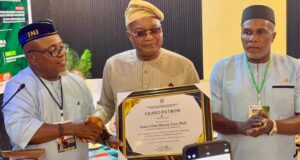…From discipline to compassion, residents say past and present leaders are leaving lasting imprints on security
By Saviour Ekpe, Ph.D
 When CP Baba Muhammed Azare assumed duty as Commissioner of Police in Akwa Ibom State, not many predicted the quiet revolution he would set in motion. Known in policing circles for his sincerity and discipline, Azare brought with him a leadership style that is already reshaping both the morale of officers and the confidence of the public.
When CP Baba Muhammed Azare assumed duty as Commissioner of Police in Akwa Ibom State, not many predicted the quiet revolution he would set in motion. Known in policing circles for his sincerity and discipline, Azare brought with him a leadership style that is already reshaping both the morale of officers and the confidence of the public.
 Across divisions and formations in the state, his influence is visible. Divisional Police Officers’ (DPOs) acts speak more boldly about discipline, training, and responsibility. At Itam Division, CSP Emeka Ekebuike often reminds his men that policing is not just about uniforms and patrol vehicles—it is about service, “The Commissioner has shown us that integrity is leadership,” he is often heard telling his team. Over at Ikot Ekpene, CSP Uduak Ntuk delivers a similar charge, instructing officers to carry themselves in a manner worthy of the badge. Both DPOs and many others admit they are following the example Azare sets from the top.
Across divisions and formations in the state, his influence is visible. Divisional Police Officers’ (DPOs) acts speak more boldly about discipline, training, and responsibility. At Itam Division, CSP Emeka Ekebuike often reminds his men that policing is not just about uniforms and patrol vehicles—it is about service, “The Commissioner has shown us that integrity is leadership,” he is often heard telling his team. Over at Ikot Ekpene, CSP Uduak Ntuk delivers a similar charge, instructing officers to carry themselves in a manner worthy of the badge. Both DPOs and many others admit they are following the example Azare sets from the top.
Acts of Humanity
It is often said that leadership trickles down, and recent acts by rank-and-file officers prove it. In Ikot Ekpene, Sergeant Tom Inyang earned praise from community members when he used his own money to feed inmates in custody, ensuring no one went to bed hungry. In Itam, Woman Inspector Otobong Sunday quietly did the same on a different occasion, dipping into her modest salary to provide meals, transportation and other logistic needs for detainees.
These gestures, though simple, spoke volumes. Residents saw them as evidence of a police culture that is shifting from mere enforcement to genuine humanity. “We have never seen this kind of compassion before,” said Mrs. Ekaette, a trader in Ikot Ekpene. “It makes us feel the police are beginning to care about people, not just about power.”
The Shadow of a Legacy
Yet, while Azare’s leadership is winning hearts in real time, the name of Retired Deputy Commissioner of Police (DCP) Francis Osagie Erhabor continues to echo across communities. Years ago, when he served as DPO in Itam, Erhabor distinguished himself as an officer of rare integrity, sincerity and firmness. He became known for rejecting bribes, enforcing discipline without compromise, and setting standards that even his harshest critics admired.
Chief Ini Umoh, a respected elder in Itam, recalls those days vividly, “Erhabor changed the way our people looked at the police,” he said. “Before him, trust was low. But he showed us that there can be integrity in the Force.” Elder Nsima Etim adds: “Many of the officers who served under him are still walking in his footsteps. That is why we say his influence lingers.”
Divine Reward for Integrity
This lingering influence recently found fresh recognition when Governor Pastor Umo Eno appointed Retired DCP Erhabor as Senior Special Assistant (SSA) on Intelligence. For many in Akwa Ibom, the appointment was more than political—it was symbolic. Community leaders described it as a “divine reward” for years of resilience, integrity, and commitment to duty.
“Governor Umo Eno did not just appoint a man,” said Elder Etim. “He rewarded sincerity. He rewarded integrity. And he gave hope to young officers that honesty can still be recognized in this country, even in a strange land”.
The appointment has further cemented Erhabor’s place in the hearts of many Akwa Ibom residents. It has also sent a powerful message to officers still in service—that doing the right thing, even when it is unpopular, carries long-term rewards.
A Blend of Past and Present
What makes the current policing story in Akwa Ibom unique is the interplay of Azare’s present leadership and Erhabor’s enduring legacy. The two men, though at different stages of their careers, embody values that reinforce one another—discipline, sincerity, and service.
Analysts say this blend of past and present is shaping a new policing culture in the state. Erhabor’s shadow ensures that officers remember the cost of integrity and discipline, while Azare’s visible reforms provide fresh motivation to act on those values. “It is like two waves meeting,” said Dr. Bassey, a criminologist at the state university, “One from the past, one from the present, together creating a tide of reform.”
Community Voices
On the streets, people are beginning to notice. Traders at Itam Market say patrols are more consistent, and officers now engage with them more respectfully. At Ikot Ekpene, young people report that the police have become more approachable, “Before, we were scared to even talk to them,” said Emmanuel, a student. “Now they ask us questions, they listen to us. It feels different”.
For Mrs. Ini, a food vendor, the change is measured in safety and livelihood, “We used to close our shops by 7 p.m. because of fear,” she said, “Now we can stay open until 9 or even 10pm. That is progress”.
Looking Ahead
As CP Azare continues to make waves with reforms that emphasize sincerity, liberality, and discipline, many believe the Command is heading into a new era of public trust. Yet, they are quick to note that the seeds of this change were planted long ago by men like Retired DCP Erhabor and others, who showed that integrity in the police force is possible.
In the words of a senior officer at the state headquarters who pleaded anonymity, “Erhabor gave us a legacy. Azare is giving us a direction. Together, they are showing us that policing can be both firm and humane”. For Akwa Ibom State, this mix of continuity and change is more than a policing story—it is a reminder that leadership, when grounded in sincerity and discipline, leaves a lasting mark on both officers and the people they serve.
 Newsfront Online Newsfront Online
Newsfront Online Newsfront Online




